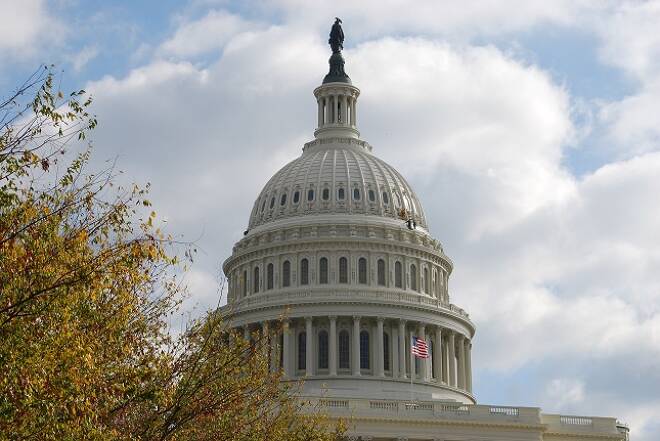Advertisement
Advertisement
The Week Ahead – Geo-Political Risk and the Economic Calendar in Focus
By:
A busy economic calendar and a plethora of geo-political risks to drive the markets through the week, with the U.S President at the center of it all.
On the Macro
For the Dollar, economic data is on the heavier side, with key stats including August consumer confidence numbers on Tuesday, 2nd estimate GDP numbers on Wednesday, the FED’s preferred July Core PCE Price Index figures and personal spending numbers on Thursday, together with August PMI numbers out of Chicago and finalized consumer sentiment figures on Friday. Outside of the data, the Oval Office will continue to influence, with Robert Mueller’s investigations gaining traction. The Dollar Spot Index ended the week down 0.99% at $95.146.
For the EUR, it’s a busy week ahead, with business sentiment and consumer confidence figures out of Germany on Monday and Tuesday, French GDP numbers on Tuesday, Germany employment numbers on Wednesday and August prelim inflation figures out of Spain, France, Germany, Italy and the Eurozone through the week to also influence. The EUR/USD ended the week up 1.61% to $1.1622.
For the Pound, it’s another quiet week ahead, with stats limited to house price figures that will leave the Pound in the hands of Brexit chatter through the week. The GBP/USD ended the week up 0.76% to $1.2846.
For the Loonie, focus will be on 2nd quarter GDP numbers due out on Thursday, with any resumption of tri-party NAFTA talks to also influence. The Loonie ended the week up 0.27% to C$1.3026 against the U.S Dollar.
Out of Asia, it’s relatively busy week ahead.
For the Aussie Dollar, stats through the week include July building approval and 2nd quarter CAPEX figures due out on Thursday and July private sector credit numbers on Friday. The Aussie Dollar will also be influenced by political noise following Turnbull’s ousting on Friday of last week and sentiment towards trade and China’s economy. The AUD/USD ended the week up 0.22% to $0.7329.
For the Japanese yen, stats through the week include July retail sales figures due out on Thursday and finalized July industrial production, August Tokyo core inflation figures and July employment numbers on Friday, retail sales and inflation figures the key drivers through the week. The Japanese Yen ended the week down 0.67% to ¥111.24 against the U.S Dollar.
For the Kiwi Dollar, economic data is limited to July building consents and August business confidence figures due out on Thursday. Business confidence figures will likely be the key driver, while sentiment towards trade and economic data out of China will also provide direction. The Kiwi Dollar ended the week up 0.50% to $0.6670.
Out of China, stats out of China are limited to the government’s August private sector PMI numbers, the markets looking for any further signs of weakness that would drive demand for the save havens and the Dollar. Forecasts are for a slight uptick in private sector activity that would leave focus on trade war chatter through the week.
Geo-Politics
Brexit: With Brexit negotiations having resumed last Tuesday and the government having released no-deal impact analysis documents in the week, we can expect more noise in the coming week that will not only influence the Pound, but also UK equities.
Loonie Woes: Still no conclusion to talks between the U.S and Mexico to open the door for the Canadian government to re-enter the fray. Things could accelerate should Mexico and the U.S come to an agreement on autos and energy.
U.S – China Trade War: As expected, there was no progress from low level talks between the U.S and China on Wednesday and Thursday of last week, leading to the U.S rolling out 25% tariffs on an additional $16bn of Chinese goods at the end of the week. How China responds to the latest tariffs will be of influence as the war is set to continue until the respective nations’ leaders meet face to face.
Iran: Things are moving quickly and, with international carriers, including BA, Air France-KLM, scheduled to cancel routes to Tehran by late September, Iran’s isolation is just going to get worse, with oil average exports already reportedly down more than half a million barrels a day in the first 2-weeks of August. Support for oil prices have kicked in and unrest on the streets of Tehran may hit the headlines once more, with the Revolutionary Guards likely to be at the ready to disrupt supply from the Gulf.
Turkey: Following public holidays through most of last week, we can expect the Turkish government to be hard at work to begin delivering the markets with fiscal and monetary policy plans to address inflation and the slide in the Turkish Lira, not to mention concerns over an economic meltdown.
Russia and the Rest: While focus has been on China, more sanctions could be hitting Russia in the week ahead. President Putin has been relatively silent of late. It remains to be seen whether the silence will continue as Trump continues to turn the screw. South Africa joins the list in the week ahead, the U.S President raising the issue of land ownership, which could see Trump hit the rand should he threaten economically punitive measures. Another new member to the geo-political risk list is Australia, following last week’s ousting of Prime Minister Turnbull. Focus will be on policy and how the government plans to restore confidence, which will dictate direction for the Aussie Dollar.
About the Author
Bob Masonauthor
With over 28 years of experience in the financial industry, Bob has worked with various global rating agencies and multinational banks. Currently he is covering currencies, commodities, alternative asset classes and global equities, focusing mostly on European and Asian markets.
Advertisement
